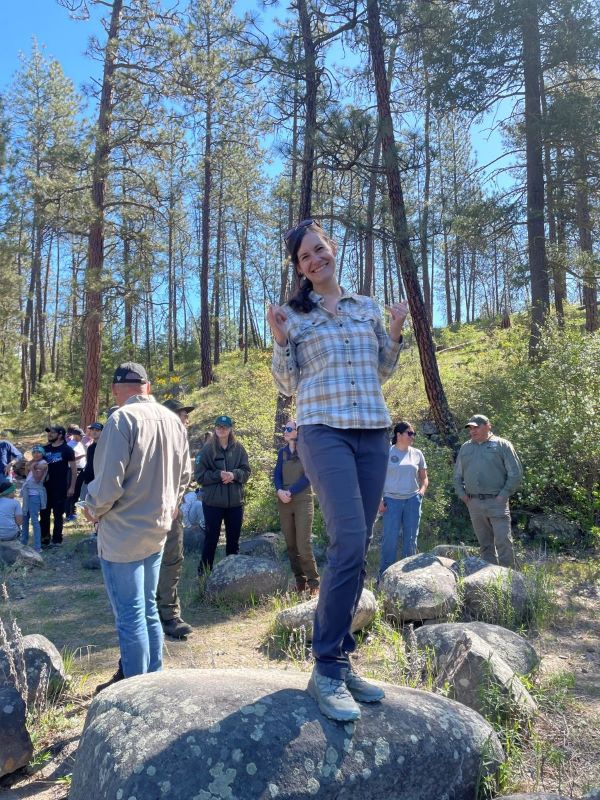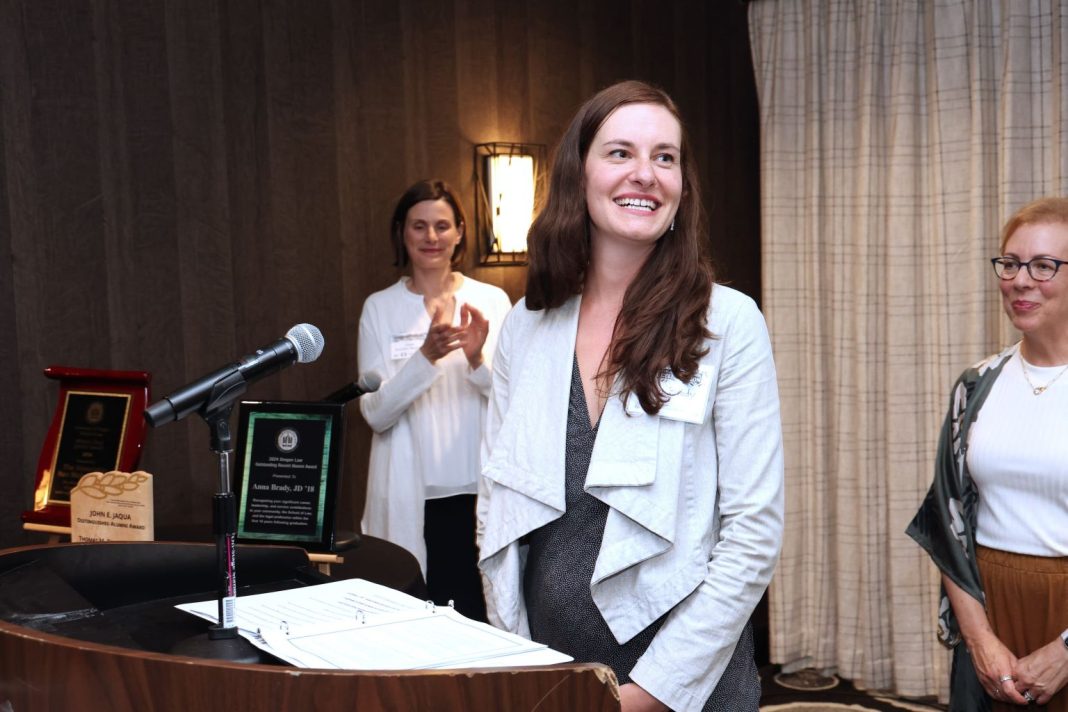Growing up on the Olympic Peninsula in Washington state surrounded by a diverse environment, Anna Elza Brady developed an interest in the relationship between human beings and nature.
“As a young adult, I began exploring ways that our species might better coexist with the broader biotic community,” Brady said. “I became involved in actionable work and saw I could use my skills in a positive way through the law.”
And that’s exactly what she’s been doing for more than five years as an associate with the Seattle law firm Ziontz Chestnut.
While she occasionally deals with conservation issues for local governments and non-governmental organizations, Brady primarily represents Native American tribes on natural resources matters.
“Much of what I do lies at the intersection of environmental law and social justice,” she said. “It’s gratifying work. Indian law is a distinct area of the law, and I consider it an incredible privilege to use my skills as a lawyer to amplify and elevate the voices of historically underrepresented communities and sovereign nations.
“Tribes are distinct, but one thing they have in common is a profound relationship to the land, waters, plants and animals that have sustained their cultures, economies and spiritual traditions for millennia.”
Developing her skills
Brady brings a wealth of training and experience to the job.
As an undergraduate at University of Montana in Missoula, she worked for the Environmental Defense Fund as a grassroots organizer lobbying for federal climate change legislation.
After completing a master’s degree in environmental humanities at University of Utah, she served as the policy and communications strategist for a nonprofit called Utah Diné Bikéyah, which means “people’s sacred lands” in Navajo. This group spearheaded a tribally led effort to designate Bears Ears National Monument.
Her work on that initiative extended into her time at University of Oregon School of Law and helped Bears Ears come the first Native American national monument in 2016.
While at Oregon Law, Brady was a Native Environmental Sovereignty Fellow with the Environmental & Natural Resources Law Center, a Wayne Morse Center Legal Fellow and co-director of the Native American Law Students Association.
Brady honed her interest in Indian law by taking courses with Howard Arnett, a professor of practice at Oregon Law.
“When I first met Anna, she was primarily interested in pursuing environmental law,” Arnett said. “But through her experience working on Bears Ears and after taking my courses, she decided to focus on Indian law.”
After graduating Order of the Coif in 2018 with a certificate in environmental and natural resources law, she clerked for Washington State Supreme Court Justice Susan Owens.
Licensed in Washington and Montana, Brady joined Ziontz Chestnut in 2019. The firm has a long history of representing tribes across the country.
“To be the first lawyer in my family and work for a firm that practices in the two legal fields I find most compelling, I feel lucky to have landed where I am,” she said.
A diverse practice area
At the law firm, Brady has played a key role in helping secure wins for several tribes, including a $200 million agreement with the federal government in 2023 that provides for the reintroduction of salmon into the Upper Columbia Basin above the Grand Coulee Dam.

Brady said it was a historic settlement involving several government agencies, including the U.S. Army Corps of Engineers and the U.S. Bureau of Reclamation. The agencies agreed to support and fund the Confederated Tribes of the Colville Reservation and two ally tribes as they study the feasibility of reestablishing salmon in waters they inhabited for thousands of years prior to construction of the dam.
“The Grand Coulee Dam completely blocked salmon migration into the upper Columbia River,” Brady said. “The settlement agreement involves the U.S. government fully funding and supporting salmon reintroduction, without removing or interfering with the operations of the dams.
“Salmon not only comprised a vast proportion of the nutrients these tribes historically consumed but also fundamentally inform who they are as peoples.”
In addition, Brady has worked closely with other members of the firm to restore the Makah Tribe’s ability to exercise its right to hunt gray whales under the 1855 Treaty of Neah Bay.
The bay is located at the northwestern tip of Washington state. The treaty not only secured the tribe’s whaling rights but also gave the tribe authority to catch fish and hunt other marine mammals and land animals in the area.
“The tribe gave up vast areas of territory in order to maintain these rights, which remain crucial to their culture and identity,” Brady said. “But after commercial whaling decimated the gray whale population, the Makah voluntarily ceased the practice for decades. Once gray whales made a strong recovery, the tribe began seeking a pathway to return to its traditional practice under its treaty rights.”
A successful Makah whale hunt took place in 1999, but the tribe’s ability to continue the practice was subsequently curtailed by a federal court ruling.
In 2005, the tribe began a long process to obtain a waiver to resume whaling. The waiver was issued in 2024 after a protracted administrative and judicial process.
“We are now working on behalf of the tribe to obtain the first hunt permit under the waiver,” Brady said. “The hunt, which is conducted from a traditional canoe and relies on tribal customs, will hopefully resume in the near future.”
In addition to working on Indian law issues, Brady and her colleagues litigated Conservation Northwest v. Hilary Franz, who was the state commissioner of public lands. It resulted in a unanimous landmark Washington State Supreme Court decision recognizing the duty of the state’s Department of Natural Resources to manage public lands in a manner that considers evolving environmental, economic and social needs.
Moving forward
Brady said she expects that Trump administration policy changes will broadly affect environmental law.
“In addition to possible overhauls of longstanding regulatory processes, a major concern is the recent ‘reductions in force’ and how those layoffs may affect attention given to environmental issues and tribal matters,” she said. “There could be some limited upshots of a Republican administration, such as the potential to reform the Marine Mammal Protection Act, which has inadvertently led to ecological imbalance in marine systems in the Pacific Northwest.”
Brady said the environmental community and tribes are bracing for a few tough years.
“I expect we will see attempts to substantially roll back policies protecting public lands, natural systems and environmental justice,” she said. “As during the first Trump administration, there is going to be a lot of need and work for environmental lawyers.”
Brady said she’s found her stride working at the nexus of Indian law and environmental law and has no plans to change course.
“I can’t imagine a more fulfilling legal practice,” she said. “Assisting tribes in defending their essential natural resources makes the world better for all of us, Native and non-Native alike.”
This article appeared in the 2025 Spring issue of The National Jurist.

